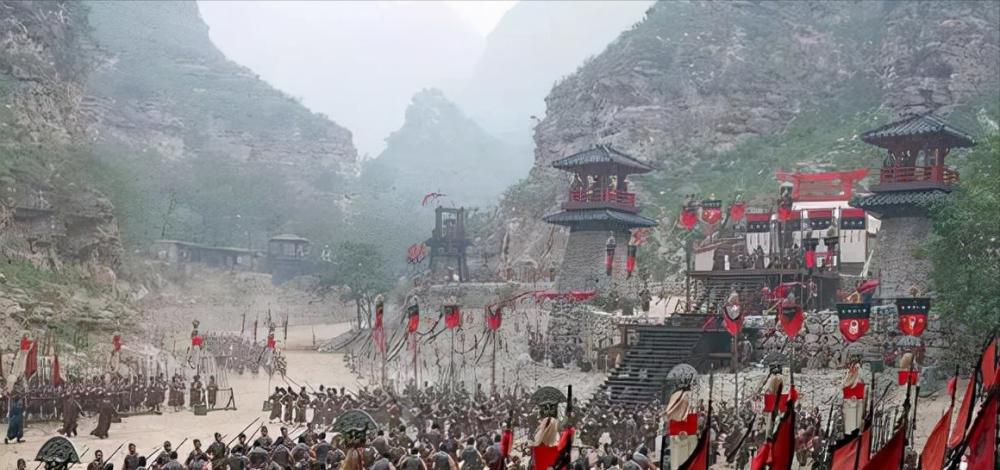Bypassing it, of course, is fine, but are you sure that bypassing it will be all right?
The biggest reason why ancient wars always emphasized these "important places" and "fortresses" was the inconvenience of transportation.
The length of a team that can march in a day is limited, the terrain it can pass is also limited, and the length of supplies is even more limited.

This kind of marching is a kind of attrition, and the physical exertion when marching on foot, the loss of personnel when crossing mountains and mountains, the attrition of combat during enemy harassment, the non-combat attrition caused by disease, and so on are all major problems.
Until the development of satellites and other information equipment, there are still modern troops lost in the march, away from the road and rely solely on maps to march, even if there are compasses and other equipment still have problems. For example, in the memoirs of "Brothers Company", Lieutenant Sauber of the training camp did not understand the map very well, and as a result, he led the troops in the opposite direction and made a big mess.
Therefore, the troops simply cannot advance indiscriminately, especially for the ancient armies, and every step needs to be properly arranged. Although the army opens the way every mountain and builds bridges when it encounters water, if the army uses all its strength to open the way in the wilderness, then this army will not have to fight any battles.
Even today, with the assistance of mechanization, it is not easy to open a path in the wilderness. In 1937, in order to cope with the threat of resistance from Japan, the Nationalist government decided to build the Burma Road on the border, and as a result, this 959-kilometer road, with both central appropriations and requisitions, as well as the most advanced army independent engineer corps, the construction team directly under the Ministry of Communications and the local Yunnan Provincial Government, still took nearly 1 year to repair, which can be described as extremely arduous, so that ancient people could not do this work at all.
Therefore, the significance of "roads" in ancient times is extraordinary, each road is a hard-won strategic place, and the cities and fortresses built on these roads are naturally the top priority. Where there are roads that can pass through the army, where cities and pools can do strategic transit, and where fortresses can affect strategic progress are all quite serious issues.
Because the road is so important, when the enemy city blocked the road, the ancient army did not have a good way but to break through the city. In the absence of roads, bypassing is to ask for trouble, whether you can reach the destination is a problem, what battle is this?
For example, Nurhaci attacked Shanhaiguan during the apocalypse, attacked the Ming army fortress all the way, chewed under Ningyuan City for a long time, and finally accidentally let the red-clad cannon bombard him to death. Later, Emperor Taiji also ran to besiege Ning and Jin, trapping the city for 24 days, and the result was still gray and slippery withdrawal.
For the Later Jin, the Ningjin Defense Line was the chain that strangled them, and if they did not break through this line of defense, the Jin army would be unable to do anything, and it would be impossible to complete the plunder of the Ming Dynasty Guannei.
Of course, there are no absolutes in the world, battles have always been won by coincidence, and there has been no shortage of examples of people bypassing the city and the city, completing the victorious march through the path or throwing away this city, and we must not take "the city and the pool cannot be bypassed" as the golden rule, and the war is fought with human wisdom and ability.
By the time of the Ming Dynasty Chongzhen's 2nd year of "The Change of Self"(Later Jin's Attack on the Battle of Ming Gyeonggi), Emperor Taiji raised 100,000 troops to attack Daming, but this time he did not fight with the Fortified Fortress of the Ningjin Defense Line, but instead let this place go, ran to detour from Mongolia, and then attacked the Great Wall defense line at Xifengkou, and detoured from the ruined Jizhen area to the city of Beijing through Zunhua.
After this battle, Jin first killed 7,000 Ming troops in a night attack at Lugou Bridge, then killed Mangui and Sun Zushou at Yongdingmen, and finally plundered the surrounding Tongzhou, Qian'an, Zunhua, and Luanzhou before retreating, almost forcing the Ming Dynasty to move its capital. The change directly prompted Yuan Chonghuan to go to prison and be executed by Ling Chi.
There is also a negative example of the "Battle of Wild Fox Ridge" between the Jin Dynasty and Mongolia, the commander of the Jin Army, Yan Chengyu, was afraid that the Mongol army would bypass him and directly attack Zhongdu, so he simply abandoned the three prefectures of Huan, Chang, and Fu, and wanted to rely on the mountains of Wild Fox Ridge to resist the Mongolian army, and the result was that the field was no better than the city pool, and the army was stationed, although it was very scattered, and it could not be twisted at all. The Mongol army soon broke through many key points of the Jin army and slaughtered the Jin army like hunting in the mountains.